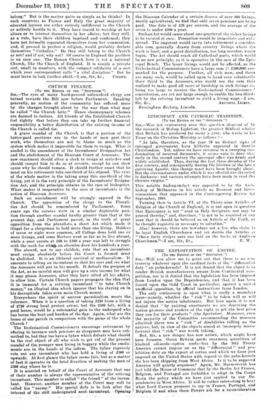CHURCH FINANCE.
(To THE EDITOR Or THE " SPECTATOR.")
Sra,—The eyes of many hard-pressed unbeneficed clergy are turned towards the Bill now before Parliament. Speaking generally, no section of the community has suffered more by the changes brought about by the war than what may be called " the Church laity." Hence eleemosynary schemes are doomed to failure. All friends of the Established Church feel rightly that before they can take up further financial responsibility a better distribution of the existing income of the Church is called for.
A grave scandal of the Church is that a portion of the better-paid positions are in the hands of men past their work, who themselves are not to blame so much as the system which makes it impossible for them to resign. What is needed is the amendment of the Incumbents' Resignation Act and the abolishment of the Diocesan Court of Assessors. The new enactment should allow a clerk to resign at sixty-five and should compel him to do so at seventy, except he can show cause why he should remain. It should further enact that he must on his retirement take one-third of his stipend. The crux of the whole matter is the taking away this one-third of the living, yet it is the very principle of the Incumbents' Resignation Act, and the principle obtains in the case of bishoprics. What makes it inoperative in the case of incumbents is the action of Diocesan Assessors.
Such an amendment will be strongly opposed in the Church. The opposition of the clergy to the Pluralities Act should be remembered by Parliament. Some years ago the curates were in a similar deplorable position through another scandal hardly greater titan that of the present day, and Parliament passed, in the teeth of great opposition from the pluralists, a short Act which made it illegal for a clergyman to hold more than one living. Holders of seven or eight were common, all College dons held one or more livings, and some Rectors went so far as to live abroad, while a poor curate at 260 to £100 a year was left to struggle with the work for whit* an absentee drew his hundreds a year.
The absurd, not to say childish, rule that an incumbent must resign absolutely before the Court is formed must be abolished. It is an illiberal survival of mediaevalism. It amounts to telling an incumbent to shut his eyes and see what the Assessors will put in his mouth. It defeats the purpose of the Act, as no careful man will give up a sure income for what it may please Assessors, after they have sifted all his affairs, to allow him. Certain Church papers propagate the idea that it is immoral for a retiring incumbent " to take Church money," an illogical idea which ignores that his staying on in his decrepitude takes even more Church money.
Everywhere the spirit of narrow parochialism meets the reformer. When it is a question of taking 2250 from a living of £750 strong local protest arises, but the £500 left, with a good house, would be a substantial gain to the underpaid who has borne the heat and burden of the day. Again, what are the losses of one parish in comparison with the gains of the whole Church ?
The Ecclesiastical Commissioners encourage retirement by offering to increase such pensions as clergymen may have subscribed to, but they too have a bylaw which defeats what should be the real object of all who wish to get rid of the present scandal of the younger men living in beggary while the emoluments are in the hands of the infirm. The bylaw expressly cuts out any incumbent who has held a living of 2500 or upwards. At first glance the bylaw seems fair, but as a matter of fact it operates in the fatal direction of making the man of 2500 stay where he is. It is asserted on behalf of the Court of Assessors that one of their number is always the representative of the retiring incumbent. This member is called " the friend" of the incumbent. However, another member of the Court may well be called his "enemy." His special dufy is to look after the interest of the still widesiguated next-incumbents ,Opening•.
the Diocesan Calendar of a certain diocese of over 600 livings, mostly agricultural, we find that only seven pensions are being paid. One dole is of £25 per annum, and the average of the seven is under £100 a year.
Such an Act would cause about one-quarter of the richer livings to be vacated at once. Promotion would be immediate and with). spread. The impotent would carry into retirement a considerable sum, generally drawn from country livings where the work is least, and a great distribution, too long overdue, worrat begin. The Act should reach all Cathedral posts, which would be no new principle, as it is operative in the case of the Episcopal Bench. The lesser livings would not be affected, as the Ecclesiastical Commissioners have a large sum (? £100,000) earmarked for the purpose. Further, all rich men, and there are many such, would be called upon to hand over voluntarily their third to the Assessors, who would use the sum thus realized to make good all cases of hardship in such livings as. being too large to receive the Ecclesiastical Commissioner contribution, are yet not large enough to enable the two-thirdi left by the retiring incumbent to yield a living wage.—I am,
Sir, &c., ARENDELL WHEY. Bassinghant Rectory, Lincoln.


















































 Previous page
Previous page